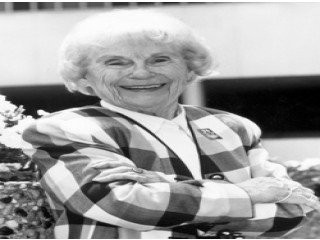
Mildred Jeffrey biography
Date of birth : 1910-12-29
Date of death : 2004-03-24
Birthplace : Alton, Iowa, U.S.
Nationality : American
Category : Politics
Last modified : 2011-10-06
Credited as : , Social activist, Presidential Medal of Freedom
0 votes so far
Jeffrey, whose birth name was Mildred McWilliams, was born in 1910 in Alton, Iowa, near the farm where her widowed grandmother had raised 16 children on her own. "Millie" was the first of seven children in the brood, and her mother also became head of a single-parent household when Jeffrey's father abandoned them. Her own mother was the first registered female pharmacist in the state of Iowa, but the family moved to Minneapolis for better educational opportunities. After high school, she enrolled in the University of Minnesota, and also joined a progressive branch of the local Young Women's Christian Association (YWCA) whose members worked to integrate Minneapolis restaurants.
Jeffrey graduated with a psychology degree in 1932 and went on to Bryn Mawr College in Pennsylvania, where she earned a graduate degree in social economy and social research in 1934. She took a job in Philadelphia as a union organizer for the Amalgamated Clothing Workers of America. The union sent representatives like Jeffrey undercover into garment factories, where workers toiled long hours under dangerous conditions for meager wages. Jeffrey helped organize formal groups that demanded better wages and safer workplaces from owners and management. In 1936, she and fellow Amalgamated union activist Homer Newman Jeffrey wed, and spent the next few years traveling the United States organizing plants and factories in several states.
Jeffrey's work in the labor movement brought her to Washington, D.C. during World War II, when she served as a consultant to the War Labor Board. In this capacity she came to know Walter, Victor, and Roy Reuther, the brothers who played a key role in the founding of the United Auto Workers (UAW) union. The UAW emerged as one of the most powerful and influential labor organizations in the post-World War II era, fighting for and winning major concessions from corporate giants like General Motors. The Detroit-based union pioneered many advances that became commonplace for full-time wage-earners in America, such as health-insurance coverage and annual cost-of-living increases.
In 1944, Jeffrey and her husband moved to Detroit when Victor Reuther offered her a job as head of the UAW Women's Bureau. At the time, women had taken wartime jobs in Detroit-area automotive factories, which churned out tanks and munitions for the war effort; when American men began returning from military duty, the women who had staffed the plants were forced out in large numbers. Jeffrey's office at the UAW dealt with this issue, and she went on to serve in a number of other UAW posts. As head of its community-relations office, she brought the union into the burgeoning civil-rights movement in the 1950s, and took part in civil rights marches alongside the Reverend Dr. Martin Luther King Jr. and other key figures.
Jeffrey's long record of service made her one of the senior figures among postwar liberals in America. In the early 1970s, she helped found the National Women's Political Caucus, a group that would go on to help dozens of women achieve political office. In 1975, she chaired a Democratic National Committee task force that rewrote national convention rules to ensure that half the number of delegates in attendance in 1980 would be women. It was a groundbreaking moment that altered the American political landscape.
Although Jeffrey was well-known inside Democratic, labor, and civil-rights circles, she was relatively unknown to the general public. She ran for office only once herself, for a seat on the Wayne State University Board of Governors, which she held from 1974 to 1990. Closer to home, she helped her daughter, Sharon, and some politically minded friends find a meeting place for an anti-war group they were forming in the early 1960s on the University of Michigan campus. Jeffrey secured access to a labor-union camp on the shores of Lake Huron, about an hour outside Detroit, and the group met there and formulated the famous Port Huron Statement. Its members emerged as the Students for a Democratic Society, one of the major players in the anti-war movement during the Vietnam era.
In the run-up to the 1984 Democrat National Convention, Jeffrey gathered with other leading party figures to find a suitable running mate for the party's presidential nominee, Walter Mondale. They decided on Ferraro, a New York congresswoman who became the first woman in American history to appear on the ballot of a major political party. Though the Mondale-Ferraro ticket lost, back in Michigan Jeffrey helped a lengthy roster of women to win election by providing both concrete support and behind-the-scenes advice. "I can say with absolute conviction that without Millie Jeffrey, I would not be the first woman governor of the State of Michigan today," the Detroit Free Press quoted Michigan governor Jennifer Granholm as saying.
Jeffrey earned the highest civilian honor awarded to U.S. citizens, the Presidential Medal of Freedom, from President Bill Clinton in 2000. Fiercely independent despite her advanced years, she continued to live alone and drive before succumbing to a respiratory ailment on March 24, 2004, at the age of 93. Much as her grandmother and mother's formidable achievements were reflected in her own life, Jeffrey passed on her determination and spirit to a younger generation of achievers. "I believe in individual initiative," she was once quoted as saying in a documentary film, according to her Washington Post obituary. "In other words, that each of us has a responsibility to take some action as an individual in our own part."


















